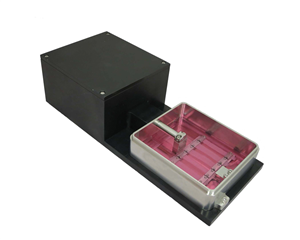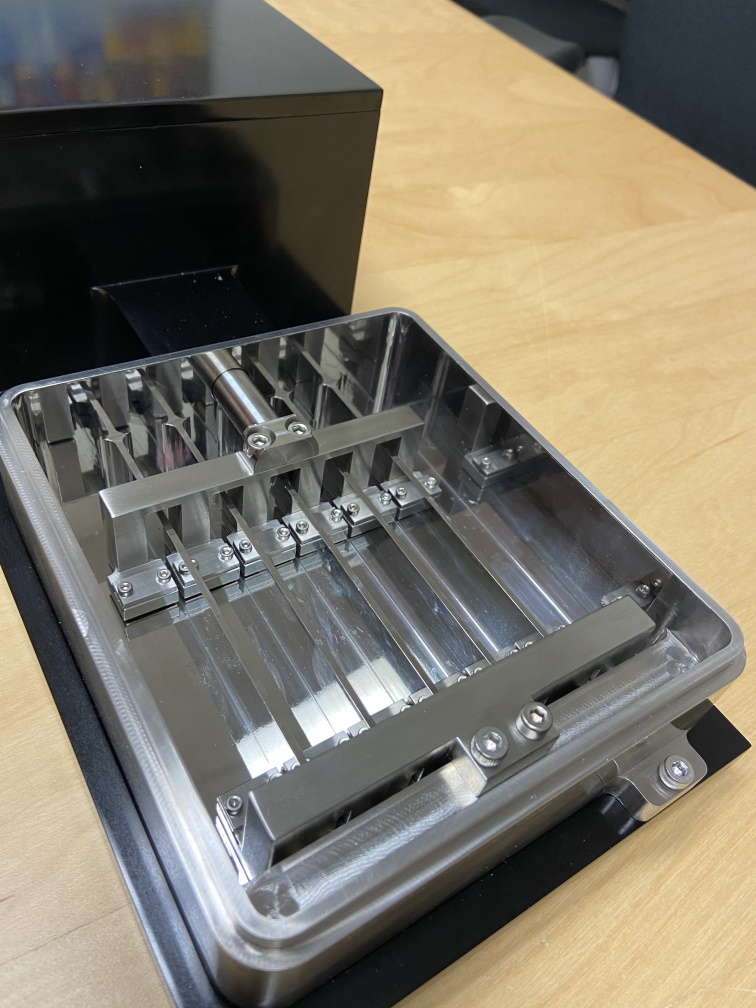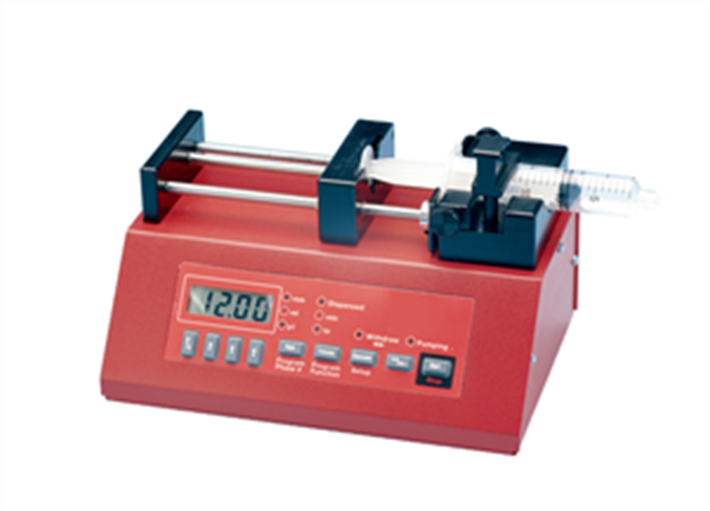
MCT6-200
Mechanoculture T6 - High force uniaxial stimulation of 6 parallel specimens
- Overview
- Citations
- Specifications
- Models
- Related Products

There are 1 images available to view - click to enlarge and scroll through the product gallery.
MCT6-200 DataSheet
/ Download as PDF
The MCT6 uses a powerful actuator and screw-driven clamp grips to apply user-specified stretch protocols. The systems support specimens up to 10mm wide and 80mm long. The system can also be adapted to wider sheet-like specimens and fiber specimens. The entire assembly can be sterilized and is suitable for long-term cell culture in a laboratory incubator.
Key Features
- Uniaxial stretch up to 80mm grip separation
- Compatible with a wide range of materials including silicone membranes, decellularized tissues, hydrogels, electrospun materials, and more.
- PC-independent operation
- User-friendly interface software for specifying simple, cyclic, and intermittent stimulation protocols for download to the device controller
The MechanoCulture T6 can uniaxially stretch up to 6 clamp-mounted specimens from 5-80mm in length. For stimulation in tendon, ligament, and bone tissue engineering work, it can deliver up to 200N of thrust. For cardiovascular research, the system can stimulate at up to 2Hz.
All components in contact with the culture can be autoclaved and the device can be run inside an incubator environment. Stainless steel grips secure the specimens at each end. The spacing and geometry of these grips can be customized to suit a variety of specimen sizes and materials.

The MechanoCulture T6 can be programmed to run constant velocity or sinusoidal stretch patterns. Magnitudes, frequencies, rest periods, and cycle counts can all be specified in the software application and programmed to the device.
A 6-well option for the MechanoCulture T6 is also available - contact us for more information

This will be the feed from an external API...
| Dimensions | 36 X 15 X 9cm |
| Weight | 3kg |
| Stimulation mode | Uniaxial tension |
| Configuration | 3D constructs and tissues |
| Culture area | 6 strips, up to 80mm long |
| Maximum strain | >100% |
| Maximum Velocity | 20mm/s |
| Maximum Cycle Frequency | 2Hz |
| Loading capacity | 200N |
| Media volume | 100-300mL |
James Britton, Katarzyna Krukiewicz, Malu Chandran, Jorge Fernandez, Anup Poudel, Jose-Ramon Sarasua, Una FitzGerald, Manus J.P. Biggs, (2021). A flexible strain-responsive sensor fabricated from a biocompatible electronic ink via an additive-manufacturing process. Materials & Design, Volume 206, 2021, 109700, ISSN 0264-1275, https://doi.org/10.1016/j.matdes.2021.109700.
Marc A. Fernandez-Yague,Alexandre Trotier,Secil Demir,Sunny Akogwu Abbah,Aitor Larrañaga,Arun Thirumaran,Aimee Stapleton,Syed A. M. Tofail,Matteo Palma,Michelle Kilcoyne,Abhay Pandit,Manus J. Biggs (2021). A Self-Powered Piezo-Bioelectric Device Regulates Tendon Repair-Associated Signaling Pathways through Modulation of Mechanosensitive Ion Channels.
Kailei Xu1,2,3†, Xixia Liu 2,3,4†, Xiaokeng Li 2,3, Jun Yin2,3, Peng Wei5, Jin Qian6* and Jie Sun1,7 (2021). Effect of Electrical and Electromechanical Stimulation on PC12 Cell Proliferation and Axon Outgrowth.
Hyeree Park, Showan N. Nazhat, Derek H. Rosenzweig (2021). Mechanical activation drives tenogenic differentiation of human mesenchymal stem cells in aligned dense collagen hydrogels. bioRxiv 2021.11.25.470026; doi: https://doi.org/10.1101/2021.11.25.470026
Alejandro Garcia Garcia,Jean-baptiste Perot,Megane Beldjilali-Labro,Quentin Dermigny,Marie Naudot,Sophie Le Ricousse,Cecile Legallais,Fahmi Bedoui (2021). Monitoring mechanical stimulation for optimal tendon tissue engineering: A mechanical and biological multiscale study. Journal of biomedical materials research. Part A vol. 109,10 (2021): 1881-1892. doi:10.1002/jbm.a.37180
Lin, J., Li, X., Yin, J. and Qian, J. (2020). Effect of Cyclic Stretch on Neuron Reorientation and Axon Outgrowth. Frontiers in bioengineering and biotechnology vol. 8 597867. 14 Dec. 2020, doi:10.3389/fbioe.2020.597867
Fernandez-Yague, M.A., Trotier, A., Abbah, S.A., Larrañaga, A., Thirumaran, A., Stapleton, A., Tofail, S.A., Palma, M., Pandit, A. and Biggs, M.J. (2020). Self-powered piezo-bioelectronic device mediates tendon repair through modulation of mechanosensitive ion channels. bioRxiv 2020.08.03.227868; doi: https://doi.org/10.1101/2020.08.03.227868
D. Kumar, S. A. Cain, L. A. Bosworth (2019). Effect Of Topography And Physical Stimulus On Hmsc Phenotype Using A 3d In Vitro Model. Nanomaterials (Basel, Switzerland) vol. 9,4 522. 3 Apr. 2019, doi:10.3390/nano9040522
J. Bracamonte, S. Saunders, S. Cole, G. Annohene, G. Tepper, J. Soares (2019). In vitro degradation of electrospun polycaprolactone tissue engineering scaffolds under cyclical dynamic loading.
D. Gaspar, Christina N. M. Ryan, Dimitrios I. Zeugolis (2019). Multifactorial Bottom-Up Bioengineering Approaches For The Development Of Living Tissues Substitutes. FASEB journal : official publication of the Federation of American Societies for Experimental Biology vol. 33,4 (2019): 5741-5754. doi:10.1096/fj.201802451R
M. S. Ali, X. Wang, C. M. R. Lacerda (2019). The Effect Of Physiological Stretch And The Valvular Endothelium On Mitral Valve Proteomes. Experimental biology and medicine (Maywood, N.J.) vol. 244,3 (2019): 241-251. doi:10.1177/1535370219829006
Mir Ali (2018). Mechanotransduction And Control Of Valvular Cell Phenotype As Tools To Inform Valvular Pathophysiology.
S. Wu, Y. Wang, P.N. Streubel, B. Duan (2017). Living Nanofiber Yarn-Based Woven Biotextiles For Tendon Tissue Engineering Using Cell Tri-Culture And Mechanical Stimulation. Acta biomaterialia vol. 62 (2017): 102-115. doi:10.1016/j.actbio.2017.08.043
F. Chen, G. Hochleitner, T. Woodfield, J. Groll, P. Dalton, B.G. Amsden (2016). Additive Manufacturing Of A Photo-Cross-Linkable Polymer Via Direct Meld Electrospinning Writing For Producing High Strength Structures. Biomacromolecules vol. 17,1 (2016): 208-14. doi:10.1021/acs.biomac.5b01316

MCFX-400
DISCONTINUED - MechanoCulture FX , 16-well cell culture bioreactor with unaxial stre...

MCB1-200
MechanoCulture B1 - Biaxial stimulation of a cells in a monolayer or 3D matrix




Request
Catalogue
Chat
Print